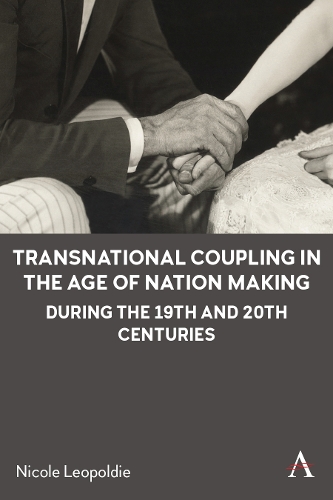
Transnational Coupling in the Age of Nation Making during the 19th and 20th Centuries
(Hardback)
Available Formats
Publishing Details
Transnational Coupling in the Age of Nation Making during the 19th and 20th Centuries
By (Author) Nicole Leopoldie
Anthem Press
Anthem Press
14th February 2023
United Kingdom
Classifications
Professional and Scholarly
Non Fiction
History: theory and methods
General and world history
306.845
Physical Properties
Hardback
168
Width 153mm, Height 229mm, Spine 26mm
454g
Description
Transnational Coupling in the Age of Nation Making during the 19th and 20th Centuries examines and compares courtship and marriage patterns that occurred between France and the United States during the 19th and 20th centuries. Departing from state-centered studies of marriage law, it draws on the methodologies of transnational history, cultural history and the history of emotion to show that these unions were part of a broader pattern of the larger cultural love affair between the two societies.
In an effort to address not only why Franco-American marriages occurred but also how and why the dynamics that produced them changed over time, this work examines and compares two transnational marriage patterns in different historical contexts: the first, when wealthy American heiresses married French aristocrats during the second half of the 19th century a period marked by relatively free transatlantic circulation and mobility and the second, when borders were far more solidified during the world wars when French women entered into matrimonial contracts with American soldiers.
The purpose of this work is twofold. In an effort to provide new categories of analysis that place the human experience into broader, more global perspectives, the first is to show how concepts of transnational marriage and courtship allow the historian to move further beyond the analytical frameworks of national histories by forcing the researcher to reconsider the ways in which one thinks about family formation and the permeability of national borders during these different stages of the national project. The second is to challenge underlying assumptions in existing historiographical explanations that those who crossed national borders to couple or to marry did so for purely socio-economic reasons. Nicole Leopoldie contends that such rationalisations are simply too narrow and that at the intersection of cross-cultural encounter and transnational coupling stood a profoundly emotional experience. Therefore, greater analytical considerations need to include both cultural and emotional motivations that were always in the background.
Situated in the methodologies of transnational history, cultural history and the history of emotions, Transnational Coupling in the Age of Nation Making during the 19th and 20th Centuries examines and compares courtship and marriage patterns that occurred between France and the United States during the 19th and 20th centuries. Because the social practices of courtship and marriage became mechanisms through which borders were crossed and new cultural spaces were created, these relationships represent important elements of transnational entanglements. This work, therefore, seeks to examine not only the ways in which observable patterns of transnational marriage emerged out of social spaces of cross-cultural encounter between the two societies but also how the dynamics of those encounters changed over time. While existing scholarship on the subject has pointed to obvious socio-economic motivations for these marriages, Nicole Leopoldie contends that such rationalisations are simply too narrow and that greater analytical considerations need to include both cultural and emotional motivations that were always in the background. By locating and identifying transnational spaces that produced marriages and analysing the cultural and emotional dimensions of those spaces, she argues that marriage participants were largely driven by a strong emotional attachment to perceived cultural differences that stretched beyond the national polity. Within the shifting global contexts of the 19th and 20h centuries, these marriages, therefore, provoke important questions regarding family formation, the role of marriage in the making of national cohesion and belonging, and the permeability of national borders during different stages of the national project.
Reviews
Placing the history of courtship between American heiresses and French aristocrats in conversation with the history of wartime unions between American soldiers and French women, this welcome addition to the literature on Franco-American relations offers a fresh take on the particular rituals, emotional registers, and contact zonesfrom high-society costume balls to Red Cross dancesthat facilitated transnational marriages in the late nineteenth and early twentieth centuries Brooke L. Blower, author of Becoming Americans in Paris: Transnational Politics and Culture between the World Wars.
An enthralling study of marital unions between American heiresses and French aristocrats during the Belle Epoque, and between American soldiers and working-class French women during the two world wars. It offers an eye-opening analysis of Franco-American cultural relations, transatlantic mobility, nationalism, and the general enshrining of marriage as the embodiment of romantic love while it also remained a social and legal arrangement Jos C. Moya, Barnard College, Columbia University, USA.
An insightful transnational analysis of courtship and marriage in the Atlantic world comparing elite Franco-American marriages of the nineteenth century and wartime marriages of the early-to-mid twentieth century. Leopoldie contributes to the history of emotions, highlighting the changing transnational spaces of feeling within which these marriages were constituted and negotiated Ian Tyrrell, Emeritus Professor of History, UNSW, Sydney.
This wonderful book examines Franco-American romantic relationships from the nineteenth century through World War II. Couples were drawn together, in part, by preconceptions that each society harbored of the other. Yet the cultural never subsumed the personal. The people in Leopoldie's book built transatlantic worlds of their own Alan Lessoff, University Professor of History, Illinois State University.
Author Bio
Nicole Leopoldie is a transnational historian who specializes in French and American cultural relations.
